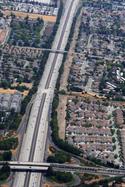My only post-graduate employment lasted 3 months. I worked for a small political consulting firm drafting online strategy for a well-funded land-use initiative. After the success of the measure, the firm’s founder sat me down, told me he loved my work but that the firm was not interested in continuing its web-based consulting. He had to let me go. It was in that same meeting that I decided to start – and pitched to my boss – my own business. read more »
Environment
Obama: Only Implement Green Policies that Make Sense in a Time of Crisis
With the exception of African-Americans, the group perhaps most energized by the Barack Obama presidency has been the environmentalists. Yet if most Americans can celebrate along with their black fellow citizens the tremendous achievement of Obama’s accession, the rise of green power may have consequences less widely appreciated.
The new power of the green lobby — including a growing number of investment and venture capital firms — introduces something new to national politics, although already familiar in places such as California and Oregon. Even if you welcome the departure of the Bush team, with its slavish fealty to Big Oil and the Saudis, the new power waged by environmental ideologues could impede the president’s primary goal of restarting our battered economy. read more »
Obama’s Friends: Enemies of the American Dream?
President Barack Obama has rightly spoken positively about the American Dream, how it is becoming more expensive and how it needs to be reclaimed. But to do this, he may have to disregard many of those who have been among his strongest supporters and the dense urban centers which have been his strongest bastion of support. read more »
Corporate Sponsorship of the Golden Gate, the Ultimate Sign of Failed Infrastructure
The most anticipated tourist attraction in the city where I live, The Golden Gate Bridge, is a testament to the lasting utility of a well executed infrastructure project. The world’s most famous suspension bridge still serves as the critical artery connecting San Francisco to the bedroom communities of Marin County to the north, where much of the city’s workforce resides. Remarkably, this marvel of engineering was completed in the late 1930s – a time when the U.S. was coming out of the Great Depression.
The New Deal brought about an expansion of infrastructure that should inspire us. Yet nearly 70 years after its completion, the sobering reality remains: it’s difficult to imagine a project of that moxie being constructed today. read more »
How Detroit Lost the Millennials, and Maybe the Rest of Us, Too
The current debate over whether to save our domestic auto industry has revealed some starkly different views about the future of manufacturing in America among economists, elected officials, and corporate executives. There are many disagreements about solutions to the Big Three’s current financial difficulties, but the more fundamental debate lies in whether the industry should be bent to the will of the government’s environmental priorities or if it should serve only the needs of the companies’ customers and their shareholders.
But there’s something more at stake: the long-term credibility of Detroit among the rising generation of Millennials. These young people, after all, are the future consumers for the auto industry and winning them – or at least a significant portion of them – over is critical to the industry’s long-term prospects in the marketplace and in the halls of Congress. read more »
Oregon’s Fringes: A New Rural Alternative
Once the bastion of a thriving rural middle class, Oregon’s rural communities are now barely scraping by. The state’s timber industry employed 81,400 residents at its peak in 1978. At the time, the industry made up 49% of all manufacturing jobs in the state according to the Oregon Employment Department.
Since then, the recessions of the early eighties and nineties, increased land-use restriction, decreased timber supply, global competition and automation of the timber industry have devastated rural communities that relied on once-plentiful timber jobs. read more »
Good-Bye, Gentry
The proposed investiture of Caroline Kennedy as the replacement senator for Hillary Clinton has inspired a surprising degree of opposition – at least from other claimants to the throne, such as the Cuomos, and from those obstreperous parvenues, the Clintons.
Perhaps less obvious may be a wider disdain expressed by even liberal New Yorkers who feel Kennedy's elevation may be one celebrity rising too many. Although the big New York editorial boards are expected to line up, like so many obedient lap dogs, grassroots dissent seethes. read more »
City Planning and The Politics of Pollution
Part Two. Yesterday, in Part One, Critser discussed scientific advances in understanding air pollution. Today, he addresses the social implications.
The new science of air pollution, with its emphasis on dose-response mechanisms, may remake the traditional advocacy realm of social and environmental justice. In the past, that world has been focused on class, race and ethnicity, classic markers of inequality and vulnerability. Today, the focus is more “exposure driven.” “Dosage… may be something people who have ignored environmental justice can get their heads around,” one researcher at last month’s Environmental Epidemiology conference in Pasadena noted. “It may get people’s attention on something that affects us all.” read more »
Will The New Air Pollution Science Choke City Planners?
Part One of A Two-Part Series
Not long ago, Michael Woo, a former Los Angeles city councilman and current member of the Los Angeles City Planning Commission, took up a case pending approval by that body: a mixed housing-retail development near the intersection of Cahuenga Boulevard and Riverside Drive. Like many of the remaining buildable sites in the city, the property is right next to a roaring motorway; the windows of some apartments would look right out onto the 134 Freeway. To Angelinos, who have grown up in a car culture, it was hardly a remarkable proposal. But Woo, perhaps one of the brainier members of the city’s political elite—after losing a mayoral race to Richard Riordan in the early 1990s he became a professor of public policy at University of Southern California—had a problem with it, and he couldn’t quite let it go. read more »
New Zealand Voters Swing Right: John Key's Shower Power
Reason magazine’s Jesse Walker opens his commentary on the New Zealand election by saying: “At least one country is responding to the financial crisis by moving to the right, not left.” This is factually correct but may overstate the case. read more »
- Login to post comments






















